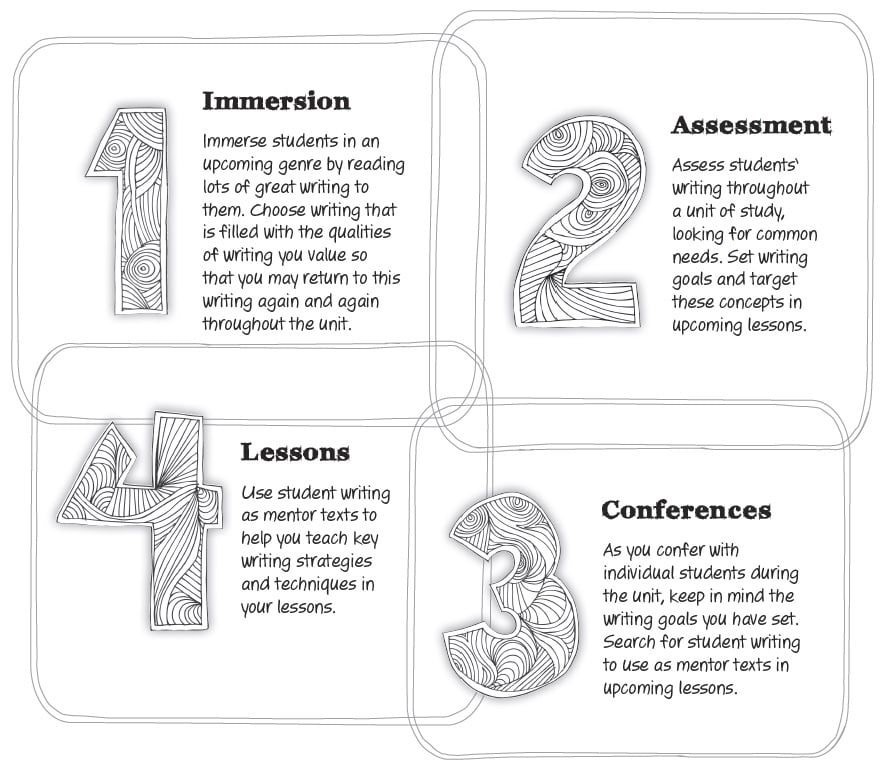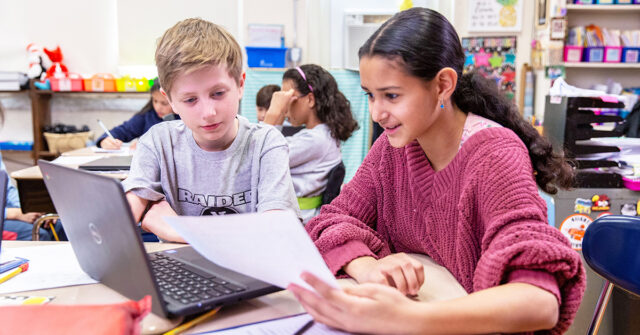
In her new book Learning from Classmates, Lisa Eickholdt lays out the idea of using students’ writing as mentor texts, helping students to self-identify as writers. As Stephanie Harvey writes in the foreword to the book, “When we value kids’ writing enough to use it to teach other kids, all kid grow into stronger writers.”
In today’s post adapted from Learning from Classmates, Lisa describes just what happens when you use student writing as mentor text.
Building the Bridge
By Lisa Eickholdt
I was recently in a first-grade classroom that was working on a personal narrative unit. One of my first lessons was on elaboration. I decided to use Jack’s writing as a mentor text, pointing out how he elaborated by describing what his character was thinking and feeling. Jack is a struggling writer so one of the purposes of using his piece as a model was to boost his confidence.
Highlighting Jack’s writing paid off later when I noticed that he was taking a risk with his latest piece. A few minutes into the independent work portion of the workshop, I paused to confer with Christina.
I talked to her for a few minutes about her story. As we talked, I decided Christina could benefit from learning Jack’s elaboration strategy. Therefore, I decided to use Jack’s piece as a mentor text in my conference. The teaching portion of my conference sounded something like this:
Me: You mentioned that you wanted to work on adding more to your piece. Can I help you with that today?
Christina: Sure.
Me: Great! In our lesson a few minutes ago, we looked at Jack’s piece and saw how he elaborated by telling what his characters were thinking and feeling. Let’s take another look at his piece and see how he did that. (I pull out a copy of his story and we reread it, paying close attention to how he used this elaboration strategy.) Now it’s your turn. Let’s read through your piece and see how you can use these elaboration techniques, just like Jack did.
Christina: I know where I can do this! Right here on this first page. (She quickly begins to write.)
Jack’s story helped Christina instantly understand this elaboration technique, something she wasn’t able to see as easily in the polished children’s literature we’d read and referred to in previous lessons. Later, in a conference with Joey, I noticed how he elaborated on his piece with purpose and intention. Keeping my group’s needs in mind, I made a quick note to use his writing as a mentor text in an upcoming lesson. In fact, with notes from all my writers, I was ready to plan the next day’s lesson, which would focus on elaborating with purpose and intention.
Using Jack’s writing as a mentor text boosted Jack’s self-esteem and helped him become more of a risk taker; but using his writing as a mentor text also helped other students become better writers. Conferring with a lens toward finding other mentor texts helped me develop the next few lessons in our writing workshop. It required a few small steps: I immersed the writers in mentor texts, including student writing as mentor texts; I selected Jack’s piece during conferences the previous week because I knew from my assessments that some of his classmates could benefit from his elaboration technique; and as I conferred, I set myself up for a highly targeted lesson with Joey’s piece. All of this occurred as part of my regular writing workshop, and required only a slight adjustment in how I look at students’ writing.
Using Jack's writing as a mentor text boosted Jack's self-esteem
The image below sets out the distinct steps you can take to incorporate student writing into your teaching. Each chapter in the book offers explicit instructions on how to use student writing as a mentor text. I’ll show you how to read your students’ work with the selection of mentor texts in mind. My notes on conferring and assessment will reveal how I matched writing I’d selected from among my students to other writers’ needs.

Using your students’ writing as a mentor text not only lifts the level of their writing, it lifts their spirits. Perhaps most important, it will affect you as a teacher. If you got into teaching to inspire students (and who didn’t?), using your students’ writing as mentor texts will help you do just that. Now, go forth and inspire!
♦ ♦ ♦ ♦
 Lisa Eickholdt has spent her entire career searching for the very best ways to help all of her students. Learning from Classmates comes from more than twenty years’ experience in classrooms as a primary-grades teacher, a Title I teacher, a Reading Recovery teacher, an interventionist, and a literacy coach. She has seen that any child can find success with the help of good teaching. Today, Lisa is Assistant Professor of Literacy Education at Georgia Gwinnett College, and she also works as a literacy consultant in classrooms nationwide.
Lisa Eickholdt has spent her entire career searching for the very best ways to help all of her students. Learning from Classmates comes from more than twenty years’ experience in classrooms as a primary-grades teacher, a Title I teacher, a Reading Recovery teacher, an interventionist, and a literacy coach. She has seen that any child can find success with the help of good teaching. Today, Lisa is Assistant Professor of Literacy Education at Georgia Gwinnett College, and she also works as a literacy consultant in classrooms nationwide.
Follow Lisa on Twitter @LisaEickholdt.


